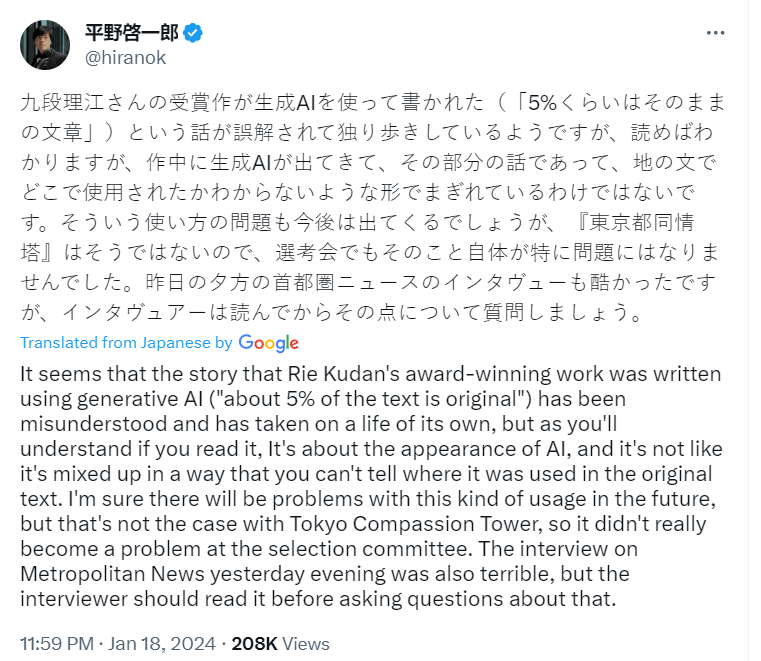Japanese author Rie Kudan disclosed her use of generative AI in writing her award-winning novel, “Tokyo-to Dojo-to” or “Sympathy Tower Tokyo.” The 33-year-old writer, who was awarded the prestigious Akutagawa Prize for the best work of fiction by a promising new writer this week, announced that approximately 5% of her book comprised verbatim sentences generated by ChatGPT.
AI assists in award-winning literature
“I plan to continue to profit from the use of AI in the writing of my novels, while letting my creativity express itself to the fullest,” Kudan stated at the prize ceremony. This bold declaration marks a significant moment in the intersection of artificial intelligence and creative writing.
At a subsequent press conference, Kudan confirmed that her novel, praised by the selection committee as “practically flawless,” includes sections word-for-word generated by AI. “The Tokyo Tower of Sympathy,” as it is also called, delves into the ethical conundrums faced by an architect designing a high-rise prison in Tokyo, weaving AI as a central theme.
Kudan shared her personal resonance with the technology, saying, “When the AI did not say what I expected, I sometimes reflected my feelings in the lines of the main character.” This unique relationship with AI echoes a growing trend among writers to integrate technology into their creative processes.
The novel’s success and Kudan’s candid admission have ignited debates within the literary community. While some, like writer and prize committee member Keiichiro Hirano, do not see Kudan’s use of AI as problematic, others on social media have voiced concerns, deeming it “disrespectful” to authors who write without technological assistance.

Japan embraces AI in libraries
Japan’s embracement of AI extends beyond literature. In addition, Yokohama recently adopted an AI-powered search service for its library system, a national first. Fujitsu Japan Ltd. and Aoyama Gakuin University developed this innovative service, which includes digital library cards and a web bookshelf function, enhancing the user experience in accessing over 4.09 million books across 18 city libraries. Last year, a Chinese professor also used AI to write a science fiction novel in just three hours, and went on to win a national competition. Not to mention, China has been using its literature to train large language models.
Read: China unveils AI large language model for ancient books
However, the broader implications of AI in creative fields are under scrutiny. Prominent authors like George R. R. Martin, Jodi Picoult, and John Grisham have joined a class-action lawsuit against OpenAI, alleging the unauthorised use of copyrighted material in training their systems. Additionally, over 10,000 authors, including James Patterson, Roxane Gay, and Margaret Atwood, have signed an open letter urging AI industry leaders to seek consent from writers for using their works in training AI models and to offer fair compensation.
As AI continues to redefine the boundaries of creativity and intellectual property, the literary world watches closely, contemplating the future of writing in the age of artificial intelligence.
[…] verk i 2022 er et levende bevis på. I januar i år vant den japanske forfatteren Rie Kudan, pris for novellen, «Sympathy Tower Tokyo» som hun skrev i samarbeid med ChatGPT. Den samme AI-tjenesten som […]
[…] as it predominantly featured translations of Western works”. The pairing of the two terms, borrowed from Japanese, was introduced very early in the twentieth century. The term is said to have begun “to appear […]
[…] Read: Japan embraces AI as author wins literary prize using ChatGPT […]